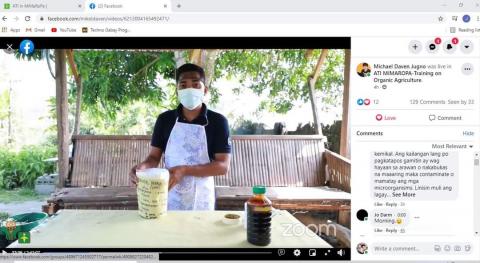Cyrus Jay Escolastico, resource person demonstrates the preparation of organic concoction via Facebook Live
As COVID-19 pandemic continually hits the country, it also hampers the activities and services from different sectors including extension activities of the Department of Agriculture (DA). However, as training and extension arm of the DA and channel of information and technologies among stakeholders, the Agricultural Training Institute - MiMaRoPa continuously provides services while adapting to the health protocols and measures through innovative approaches and platforms.
One of which was the Training on Organic Agriculture Production Technologies with Extension Support for farmers in San Jose, Occidental Mindoro on April 13-15, 2021.
The training was supposedly conducted thru face-to-face; however, due to increasing cases of COVID-19, strict health protocols and travel restrictions, it was decided to be conducted via online/virtual approach. As such, the training utilized Facebook Live since most of the farmer-participants are more familiar with Facebook rather than any other online/virtual applications. It was quite challenging to conduct online training with farmers as participants since they are used to the face-to-face trainings and actual demonstrations. That's why, the training employed innovative approaches and methodologies to sustain their interests and really appreciate the organic agriculture.
During the training, Cyrus Jay Escolastico, ATI MiMaRoPa staff and resource person discussed the Organic Agriculture and its Principles, Organic Vegetable Production, Concoctions, Lababoy Technology and organic swine production, Carbonized Rice Hull, Integrated Diversified Organic Farming System and Urban Gardening. Aside from the powerpoint presentations with pictures to visualize, the resource person presented lots of videos, particularly in the hands-on demonstration of different concoctions. He also played videos regarding the practices of ATI MiMaRoPa featuring the Integrated Diversified Organic Farming System of ATI Organic Techno Demo Site and urban gardening setting of the Center. Through these methodologies, participants were given clear ideas and concepts on how the organic agriculture works and how they can apply the technologies at home.
“Maganda din ang naging daloy ng pagsasanay kasi mayroong back-up o moderator na magaganda na sasagot sa mga tanong ng participants. Malinaw at nauunawaan ang mga modules na tinalakay dahil ito ay suportado ng video presentation,” Jovito Dimafilis, farmer-participant from San Jose, Occidental Mindoro said in his impression.
Moreover, participation was evident through sharing of ideas and asking questions in the comment section of Facebook Live. Although, some participants complained because of slow internet connectivity, but they said that they were eager to learn that they looked for areas where internet connectivity was good because they did not want to miss the topics. Also, the TMS updated them of the topics through group chat.
“Maraming salamat sa bumubuo ng Training Staff and management ng ATI at MAO-San Jose, sa mga participants na nag-effort magdutdot ng kanilang android phone just to reach FB live na talaga po namang mahirap kung hindi bihasa sa paggamit ng makabagong gadget,” Dimafilis expressed. “Nagkataon pa na nawawala ang signal kaya naghahanap talaga ako ng magandang signal,” he added.
In her comment in the Facebook Live, Maryneth Paglicawan stated that she learned a lot in the training, that despite the poor signal of internet connection, she was able to learn urban gardening and organic concoctions. She was also hoping for a face-to-face training when the pandemic ends.
Apart from the organic agriculture technologies, topics on Gender and Development, particularly the Anti-Violence Against Women and their Children Act was discussed to the participants for them to become aware of the women's rights and appreciate their contributions in the society
After the training, participants who have completed and complied in the requirements set were given mobile load as assistance for the online training. Moreover, they will be given extension support in the form of agricultural inputs such as compost, different vegetable seeds and farm tools.
The said training was attended by 27 farmers and organic enthusiasts of San Jose, Occidental Mindoro.

